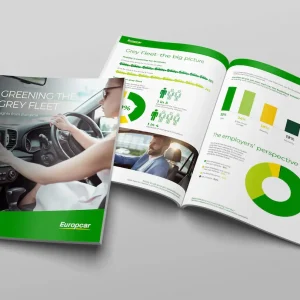It seems that many organisations have an unmanaged grey fleet, consisting of thousands of employee journeys that only become apparent when a mileage reimbursement claim lands on the desk of HR, payroll or finance.
This generates high levels of unanticipated cost alongside other risks including higher emissions, because private vehicles are generally older than company fleet cars, and the use of vehicles that may not be fit for business use, either because they need servicing or repair, are not fully maintained to the standards required or because they do not have adequate business insurance.
These issues may only come into focus during periodic or end-of-year reporting, and sometimes not even then.
Identifying the size and risk of any grey fleet means joining the dots between mileage reimbursement claims and this requires a level of collaboration that is often not efficient for businesses. Meanwhile, employees will continue to default to grey fleet if it’s easier, quicker and less perceived hassle, even though it is not usually the best business choice and often not the safest, nor even most cost-effective option, for the employee.
Changing behaviour and encouraging employees out of grey fleet often requires a more multi-modal travel policy offering a range of choices that meet a diversity of needs.
First though, businesses need to figure out if they have a grey fleet, how big it is and how much of a risk it poses to the business. Here are five key questions that help uncover the truth:
1. How big is your grey fleet, really?
Identify precisely how many employees are claiming mileage reimbursement. Your grey fleet might be much bigger than your company car and pool car fleet combined, and with much greater impact on costs and emissions than your managed fleet.
2. How much have you spent on mileage reimbursement in the past 12 months?
This is often completely unknown to those handling fleet and travel, particularly within SMEs, because reimbursement claims are handled by a different team, usually HR or finance. Knowing these numbers will enable you to quantify the immediate financial impact of the grey fleet – and arm you with data for conversations with the CFO.
3. Are your grey fleet vehicles safe, properly maintained, fit for purpose and insured for business travel?
Research shows that people are postponing vehicle repairs and scheduled maintenance because the cost of living is squeezing their finances, so the risk that they are driving a poorly-maintained vehicle is rising. Having the appropriate insurance is another aspect where rising prices mean seeking the cheapest deal, which might exclude business-use cover.
It’s the employer’s responsibility to check that employees have the appropriate licence, MOT, insurance, and that the vehicle they are driving is well maintained.
4. Was the grey fleet the most efficient and effective mode of travel for your employees when they used it?
Answering this question requires a highly detailed knowledge of the journeys your employees are taking. Where are they going and what is the purpose of their trip? Where does that journey start and end? Hybrid working makes this question more complex because the default start point is no longer ‘the office’.
Interrogating this data will help shape your travel policy to one that offers an appropriate breadth of choice to your employees, enabling them to make better travel decisions.
Vehicle booking and compliance technologies can also help you to capture this information if it’s not retained within the business, and help to inform future decision-making.
5. Do you have a travel policy and does it cover grey fleet?
The majority of driving for work is sub-100-mile trips and it’s these shorter journeys that often drop off the radar of the travel policy.
Booking planes, trains and hotels is often well-monitored, but hopping in the car to see a client or visit a supplier hardly feels like ‘a business trip’ so it might fall outside of policy. Clear communication around the choices available to employees for shorter journeys will help them to consider other options.
Andy Bland is head of business rental development UK and Ireland for Enterprise Mobility





